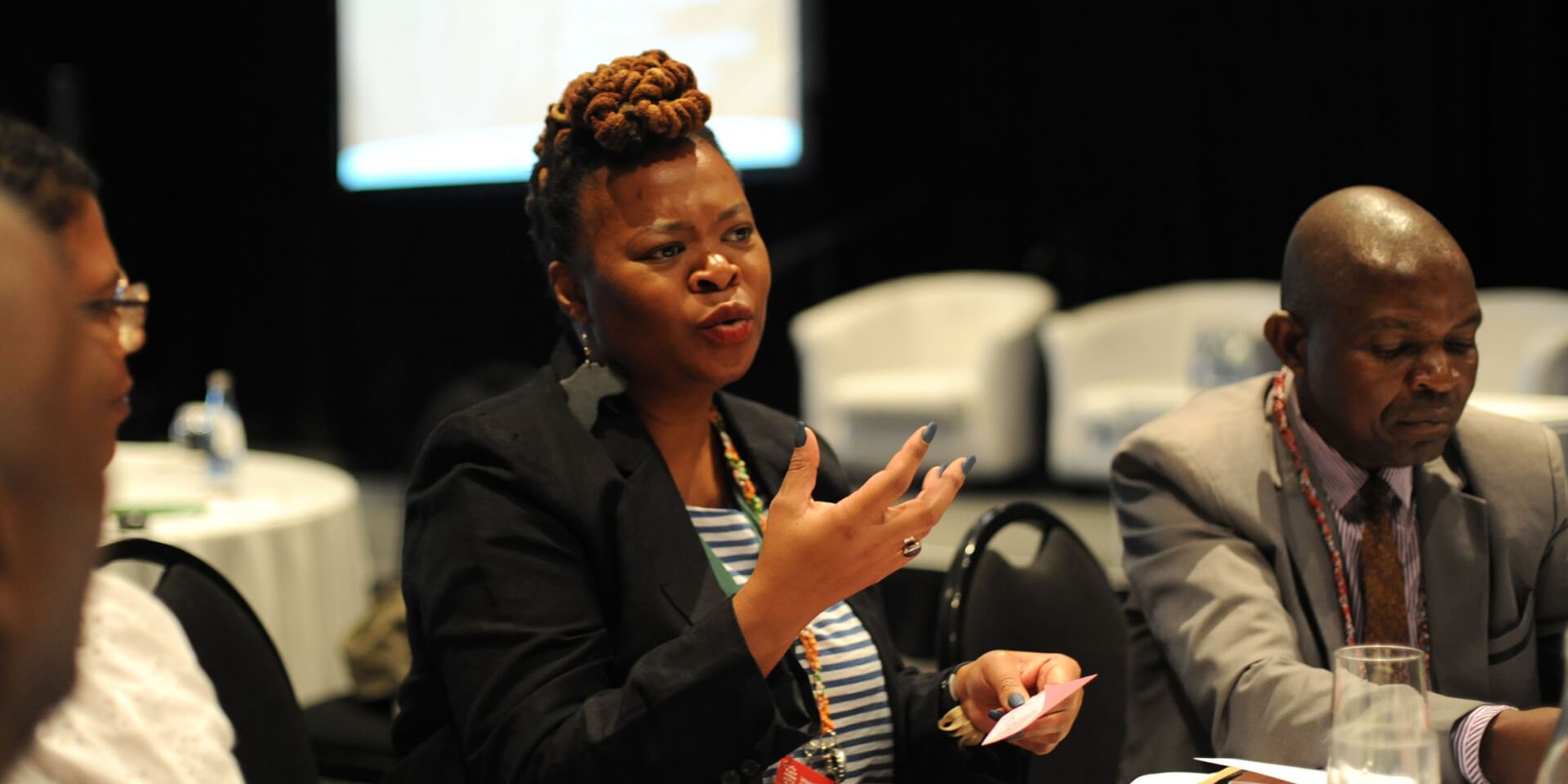
The ISC held its first in a series of Global Knowledge Dialogues in Cape Town, South Africa on the margins of the World Science Forum. More than 120 Member representatives from 40 countries attended the dialogue, which included partnerships with the Organization of Women Scientists for the Developing World (OWSD), and the Global Young Academy (GYA) and international representation from Australia, Malaysia, Japan, Turkey, Iran and the United Kingdom. INGSA chapter members and Future Earth representatives also attended the afternoon session.
Salim Abdool Karim, ISC Vice-President for Outreach and Engagement, opened proceedings, welcoming ISC Members and challenging the gathering to think about the myriad of unfolding crises that are converging on our planet.
“Science needs a strong voice, science needs a courageous voice, and science needs a voice that speaks to all of these challenges with integrity,” he said.
In his address, Peter Gluckman, ISC President, took the opportunity to inform participants of existential threats facing humanity, including issues around social cohesion, mental health, conflicts and the failings of the multilateral system, the opportunities and concerns with new technologies, and a loss of trust in elites including academia and science.
“Science is the most powerful tool we have to understand our world and address the many crises that face us. Africa must play a leading role and we look forward to ISC members convening this power”, he said.
The president outlined the Governing Board’s vision for priority areas of the ISC, which included raising the profile of the ISC to be the effective global voice for and of science, addressing gaps in the scientific endeavour for sustainability through the ISC’s Global Commission on Science Missions for Sustainability, creating the ISC charitable trust that will allow the Council to fundraise, and expanding the ISC’s membership and building the capacity of Members. He also shared his views on the positive impact the Latin American and Caribbean Focal Point was having in its first six months of operation and was confident that the focal point for Asia and the Pacific, based in Australia, and a future focal point for Africa would have the same success.
“This is our first in a series of Global Knowledge Dialogues and we have taken the opportunity at the World Science Forum to listen to representatives of the ISC membership on how we must raise the voice of science for and from Africa. The dialogue has only just begun – we are building a stronger relationship between African science and the global science community,” Gluckman said.
Participants were then introduced to incoming CEO Salvatore Aricò, who thanked the ISC for the opportunity, saying he was looking forward to getting to know the Members and support the Secretariat in the next phase of the ISC.
A surprise element was added to the Global Knowledge Dialogue in the form of “Ignite Talks”, designed to inspire and showcase Members’ science by celebrating storytelling from a personal perspective. Ignite Talks focused on the leadership journeys in science from Dr Palesa Sekhejane, Human Sciences Research Council South Africa, Dr Olubukola Babalola, Vice President of The World Academy of Sciences (TWAS) and Vice President of the Organization of Women in Science for the Developing World (OWSD), climate science from Prof Josephine Ngaira, International Geographical Union, and a personal love story weaved into astronomy by Kevin Govender of the International Astronomy Union’s Astronomy for Development Office in South Africa. The Ignite Talks energized the audience, bringing participants to their feet upon hearing the stories.
The afternoon session was dedicated to a dialogue with the members. Mathieu Denis, Science Director, summarized the results of a series of discussions held with ISC members in Africa in preparation for the event with interventions from eminent scientists:
Salim Abdool Karim moderated this lively session, where members addressed key issues in governance, capacity strengthening, funding, African knowledge systems, African identity, education, and the specific role of social sciences. Jennifer Thomson, President of OWSD, added that a pressing issue for African science was the inclusion and participation of women.
“The dialogue in Cape Town today has been enrichened by our diversity of experiences and expertise. One virtue of all present at today’s meeting is that we must urge those in decision-making roles to be guided by science”, said Michael Atchia of the Mauritius Academy of Science and Technology.
“The session was very rich with knowledgeable people who reflected on the issues of science and how it can be used to bring changes to the lives of people in my country, including reducing inequalities”, added Suad Sulaiman of the Sudanese Academy of Science.
A team based at Future Africa, the pan-African campus at Pretoria University, will support the ISC in the coming years building an effective presence and ring of focal points on the continent. Heide Hackmann, Director of Future Africa, and Prof. Twana Kupe, Principal and Vice Chancellor of the University of Pretoria, presented the activities and resources of Future Africa.
The day finished with remarks from the ISC Governing Board members present.
Françoise Baylis, Motoko Kotani and Walter Oyawa joined Salim Abool Karim and Peter Gluckman, along with Salvatore Aricò, to thank Members and partners for providing their views on the ISC’s engagement in Africa, and how to strengthen an African voice for science.
The day ended with 150 guests gathering in the lively harbour area of Cape Town for a dinner honoring Inaugural President Daya Reddy and the ISC’s first CEO Heide Hackmann, followed by the announcement of the Frontiers Planet Prize in Africa.
African ISC Members will be called upon in 2023 to continue the dialogue.